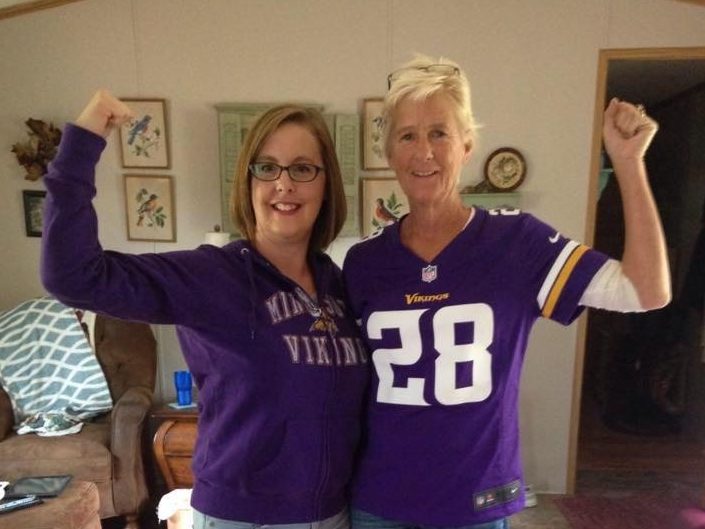A mom and daughter recently learned the importance of regular colorectal cancer screenings.
Colon cancer often starts as a benign growth, or polyp, in the lining of the large intestine or rectum. While most polyps are harmless, they can eventually turn into cancer.
Finding a polyp early greatly reduces the chances of it developing into cancer. If cancer is detected, it’s 90% treatable when discovered in its earliest stages.
Amanda Houston was diagnosed with Stage 2 colon cancer at age 34 after experiencing symptoms. She didn’t think colon cancer ran in her family. But she asked her mom to schedule a screening for the first time.
Her mom, Deb Lehn, 60, received a diagnosis of Stage 4 colon cancer that had spread to her liver.
Houston’s colon cancer was removed through surgery and didn’t require chemotherapy. Lehn had a more difficult road to remission. However, after multiple surgeries and chemotherapy, she was cancer-free just like her daughter.
“I’m not sure when she would have gone in for a screening had I not been diagnosed,” Houston says. “She was already, you know, many years past the recommended screening guideline age.”
Houston says she thinks her mother’s cancer could have been prevented if she had been screened earlier.
Colorectal cancer screening and prevention
Houston and her Sanford Health physician, Erik Fetner, M.D., stress that colon cancer is preventable in a lot of cases.
“If you get screened as recommended, it should reduce your risk,” says Dr. Fetner, a colorectal surgeon at Sanford Medical Center Fargo in North Dakota.
Screening is typically done through a colonoscopy but at-home options are available with the Sanford Polymedco FIT (fecal immunochemical test) and with Cologuard FIT-DNA.
“Through a colonoscopy, we can check for polyps,” said Brett Baloun, M.D., gastroenterologist at Sanford Center for Digestive Health in Sioux Falls, South Dakota. “They can be removed to prevent cancer from forming, or sent for analysis to check for cancer.”
“These are two very good reasons to get a colonoscopy as recommended,” Dr. Baloun said. “Especially when the procedure itself is easy. Fear can hold people back from getting a colonoscopy, but this screening could save a life.”
Early colon cancer often develops without symptoms. But in later stages, symptoms can include rectal bleeding, stomach cramps, weight loss, fatigue, or change in bowel habits. Colon cancer is the second-leading cause of cancer-related death in the United States.
Sanford Health recently ranked in the top 50 hospitals nationally for its work in gastroenterology and GI surgery, according to U.S. News & World Report. The ranking, part of the U.S. News Best Hospitals analysis, looked at patient safety, staffing and technology when determining excellence.
The colonoscopy procedure
Colonoscopies are one screening option and take approximately 30 minutes. Patients are sedated for comfort.
The procedure itself is not typically the biggest fear factor. Patients worry more about preparation.
“What most people dread is the prep, which requires cleansing the colon as well as possible,” Dr. Baloun says. “Talk with your physician about your options, and develop a prep plan based on your circumstances.”
If the results are normal, most people wait 10 years before scheduling another colonoscopy.
Who needs a colonoscopy
“If you have a personal history of polyps, colorectal cancer or inflammatory bowel disease, or a family history of colon cancer or polyps, your risk for cancer increases,” Dr. Baloun says. “In that case, screenings may need to begin before age 45 and be performed more often.”
Sanford recommends starting colorectal cancer screenings at age 45 for adults at an average risk. Talk to your doctor about the best time to start.
Houston says she expects her kids will schedule screenings in their 20s because of her early diagnosis.
Additional risk factors for colon cancer include smoking, obesity, inactive lifestyle, heavy alcohol use and Crohn’s disease.
Time to get screened for colorectal cancer
If you’ve put off the inevitable, make a colorectal cancer screening a priority. A good place to start is a conversation with your primary care provider about which screening options are best for you.
“This is the definition of preventive medicine, which is the best medicine we have,” Dr. Baloun said. “There just aren’t any excuses for not taking some time to protect your health, well-being and possibly your life.”
Learn more
- Lynch syndrome: The genetics of colon cancer
- Colorectal cancer screening: Check out the options
- Colonoscopies: Debunking the myths
…
Posted In Cancer, Cancer Screenings, Digestive Health, Fargo, Internal Medicine, Sioux Falls
